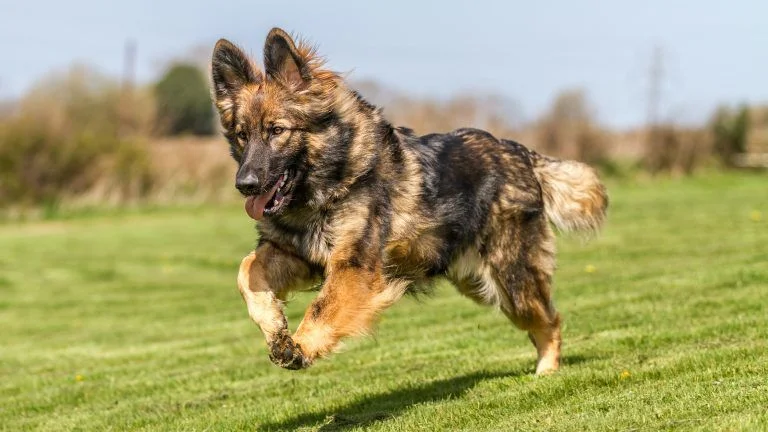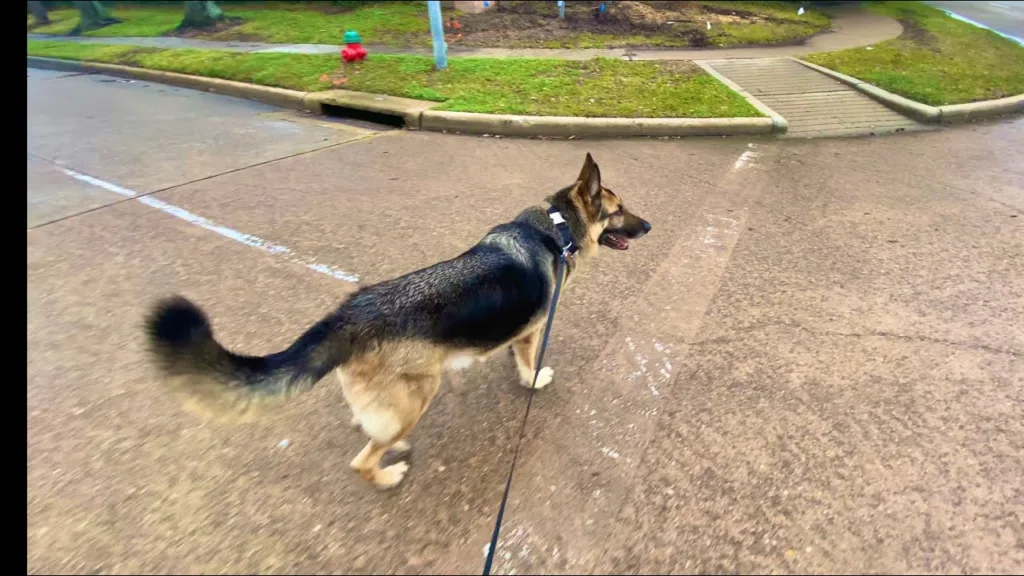When do German shepherds calm down? – is your German Shepherd Dog biting the wires and spoiling your furniture? If yours is anything like mine, you’re probably wondering when German Shepherds calm down.
At around 3 years of age, you can simply sit back and relax. As an adult, your German shepherd is finally the calm, dignified, courageous, and respectful dog you always knew he would grow up to be.
As a rule of thumb, German shepherd dogs will typically calm down between 6 months and 3 years old. It all depends on two key factors, number 1 is training and the other is spaying or neutering.
Even the best trained GSD isn’t out of the woods until at least 2 years old. That’s because their natural “drive” hasn’t yet been tempered by maturity and experience.

German Shepherds are not always hyper and some are calm but there are many aspects to this. For example, the German Shepherd’s level of hyperactivity varies dramatically with their age.
So again When do German shepherds calm down? When a German Shepherd reaches a one-year-old puppy, you should expect them to be very calm for the next 6 to 12 months.
However, if your German shepherd still continues to be hyper after two years, it will never be as high as it was during their adolescence and this is normal, and need not worry about that.
Read on to find out more about the average German Shepherd’s hyperactivity and the best ways you can calm them down and how nourishing them can have an impact!
Also Read: 5 Best Dog Bark Collars of 2021 (Anti Bark Collar Reviews)
Reasons for the Hyper German Shepherd not to be calm
There are many reasons why your German Shepherd may look overly hyperactive, but some common factors and reasons are listed below.
German Shepherd behavior stages
1. Immaturity
German Shepherds are an interesting breed because they mature very quickly physically, but inside they still have the puppy’s mind!
The mental maturity of your German Shepherd may take some time to reach their physical maturity and most of the time your dog may be overwhelmed with unlimited energy as he does not fully develop his energy levels of self-control.
Their hyperactivity peaks and falls throughout their lives so below is a rough guide:
2 to 4 months
2 to 4 months of age is quite exciting and you would enjoy the company of puppyhood, your German Shepherd puppy will be very excited and curious about everything. They are moderately hyper but have a significant error in focus and it is not uncommon for them to be energized one minute and crash the next minute while developing at this stage.
4-12 months
This is probably the age when your German Shepherd is most hyper. It has a lot of energy, so it is important that they have plenty of opportunities to be released healthy through exercise or playtime. Otherwise, you run the risk of incorporating malicious behaviors.
1 year old German shepherd behavior (12 to 24 months)
Your German shepherd is still moderately hyper at this stage, but this is a time when most German Shepherd owners will notice a turn. Yes, your German shepherd still looks more hyper than the average dog at this point and the gap between physical and mental growth seems to be greater.
But, with patience and many ways to expel excess energy healthily, at this stage, you can guarantee that your German Shepherd will be significantly calmer.
24 months + (Good time to Switch to Adult Food)
Another important criterion mentioned by many German Shepherd owners is almost two and a half years. It’s time for mental development to begin to match your dog’s physical development, which means they can now be considered fully ‘adult’.
They still have their moments, but this time they ideally have a regular and exercise regime that keeps their energy levels at bay.
Senior German shepherd behavior (8 years +)
This is the stage where the German Shepherd is considered a senior dog. When they reach this age, they are much more inclined to rest and pause as opposed to charging, but you should still continue their workout.
2. Lack of physical and mental motivation
As we have seen from the above, the key to controlling a hyperactive German Shepherd is general – it has a huge calming effect. There should be plenty of exercise in their daily routine that not only challenges their body and keeps them from gaining excess weight, but also stimulates their mind.
What a Hyper German Shepherd should do?

German Shepherds should do 90 minutes of exercise every day, as well as more intense cardio, exercises 1 to 2 times a week (you should bathe them a lot first!). If your gait is short or you are skipping cardio, your German Shepherd may not be pumping out as much energy as he needs, which is manifested in more hyperactive behavior.
The same can be said for the lack of mental stimulation. German Shepherds, hunter-gatherers, very intelligent creatures. Subsequently, if they are not intellectually challenged, they become overly and fickle and do not calm down easily.
There are many easy ways to teach your dog tricks and commands or provide interactive toys that work for their treats.
This should be done regularly and with the right combination of physical and mental exercise, you can improve the behavior and temperament of your German Shepherds.
They should just be challenged to calm down.
3. Separation Anxiety
All dogs need love, and German Shepherds are especially affectionate, widely known for their good nature and the ideal family dog. It’s important to take the time to play with your German Shepherd, whether it’s a quick game for fifteen minutes or a few hugs and treats.
If you feel that your German shepherd is lonely or alone, they may begin to develop unhealthy behaviors such as hyperactivity, they never find time with you, and eventually, when they do, they become overly aroused.
4. Hyperkinesis
Also known as canine ADHD (read more in the US National Library), this condition is very rare in dogs, but it can happen if your German Shepherd is inexplicably hyper.
However, hyperactivity is not the only symptom of hyperkinesis. Other symptoms of hyperkinesis include:
- Attention-seeking behavior.
- Small attention spans.
- Sudden nature.
So, if your German shepherd is always hyper, and these behaviors are exhibited along with these other seemingly obvious symptoms, it is a good idea to take them to your veterinarian for specialist training.
How to calm your German Shepherd
If your German Shepherd is constantly hyper, here’s what to do.
If your dog is jumping around and behaving excessively and enthusiastically, you should stay calm and ignore the dog. Interaction with your dog when excited makes the dog more excited. It teaches the dog that it’s not right to be hyper, that it’s not the message you want to send.
By being calm, you teach your dog to stay calm. If you behave enthusiastically when they behave enthusiastically, they will learn that their excited behavior is okay.
You can take a number of steps to address that behavior in a positive, long-term manner.
- Reward your dog for good behavior. Rubbing the belly and patting the head while your dog is sleeping reinforces that behavior.
- Teach your dog basic instructions about sitting and staying.
- Take time to play.Its good if it is a part of your daily routine.
- Socialize your dog with other dogs and kids through dog park visits.
Do German Shepherds calm down after neutering?
A lot of people believe that neutering your German Shepherd will calm them down. A lot of people also say neutering won’t make any difference to your dog’s behavior.
The answer is generally yes. Neutering your dog is usually the best way to ensure that his behavior will slowly calm down over time, provided he doesn’t already have any behavioral issues.
However, in some dogs, it can take several years for this process to have a noticeable effect.
Generally speaking, as long as a German Shepherd has no behavioral issues from the past history, his behavior will slowly calm down over the course of a few months after being neutered.
This is because the high testosterone levels that were driving his more aggressive and hyperactive behaviors fall to normal levels within a few months after.






